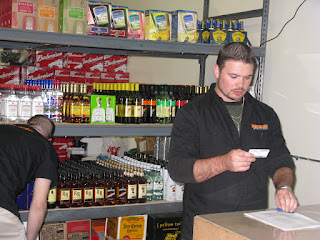 |
| Blowing snow and -40 degree temperatures in Kotzebue. |
The blowing snow reminds me that life Northwest Alaska was a lot different before technology caught up with it. HUD housing, snowgoes, ziplock baggies, the discovery of oil and minerals has created a society where winter hiberation brings depression, drunken binges, people freezing to death, and the death of a culture so deep and long that its preservation is of critical importance. Gone are the days of work to survive. While this may seem like a morbid subject to discuss in a blog, one only has to look around this wild land to see the signs.
When families lived in sod houses, the winter would be a time for craft projects. Harsh winters in buried snow, Eskimos kept busy doing bead work, sewing mukluks, skinning and tanning caribou hides, plucking snow-white ptarmagins. The arctic wind blew across the tundra on the coast. At temperatures of -40 to -50 below zero, men would run their dog teams across frozen rivers and valleys looking for meat to provide freshness to their preserved meat, seal oil, and berries. Survival alone was enough to keep them from idleness.
When the snow travelers arrived in the 1950s, life in this region changed forever. These auto crafts made hunting easier, travel to distant places more accessible, and the ready need for cash to buy gasoline and spare parts when they broke down. Now money had to be made; capitalism had begun to take hold. With the establishment of native corporations that were given the task of being profitable for their shareholders, a subsistence lifestyle was just about finished. Even the last holdouts from civilization were seduced by the advances of modern technology. There was no going back. Only through a blending of the old and the new will provide the path to a better future for the people of this region.
So what do Kotzebue residents do during these Arctic storms? There are the same things that people in the lower 48 do to entertain themselves and pass the days: television, video games, the Internet. Some get involved in such craft projects as quilting and beading, sewing, knitting, crocheting, and scrapbooking.
People also drink; some drink a lot. With the opening of the city-run package store, alcohol is easier to purchase and less expensive. Instead of paying $300 for a 750 milileter bottle of Candian whiskey on the bootleg market, citizens of Kotzebue with a registration card may pick up the same amount for less than $40.
Let us not get into the argument for or against prohibition. Remember that prohibition didn't work during the 1930s. It did not work in Kotzebue either. Controlling the sale of alcohol is a much wiser and more responsible solution to the alcohol consumption issue. The city police and Alaska State Troopers are doing a good job of minimizing the negative affects of freer alcohol consumption.
Weather like this instills a curiosity in weather itself. Accuweather.com is always open on one of the tabs on my Internet web browser. The 'Feels Like' temperature, which factors the temperature with windchill, is of particular interest. As I write this post, the temperature is -1 but with the windchill it is -35 degrees. Most people have never experienced subzero temperatures that low. We marvel at how a person can live in temperatures that cold but we spend most of our time indoors and therefore don't experience such extremes that often.
Rick and I discuss our next trip Outside. Where will it be? What is the purpose of the trip? Will we use air miles to defray the cost? Life is difficult above the Arctic Circle, and time away is necessary. Perhaps we will go to Seattle, maybe Portland or Reedsport on the Oregon Coast.
I gaze out the window of the living room window again. The wind continues to blow the light, whiteness obscuring our view. The day's light has gone; disappeared behind the hills of frozen tundra. Time between television commercials run together. Tomorrow's forecast includes more snow but less wind. Winter weather advisory by the National Weather Service is scheduled to end tomorrow at 6 a.m. Some of those questions and ponderings remain.


No comments:
Post a Comment